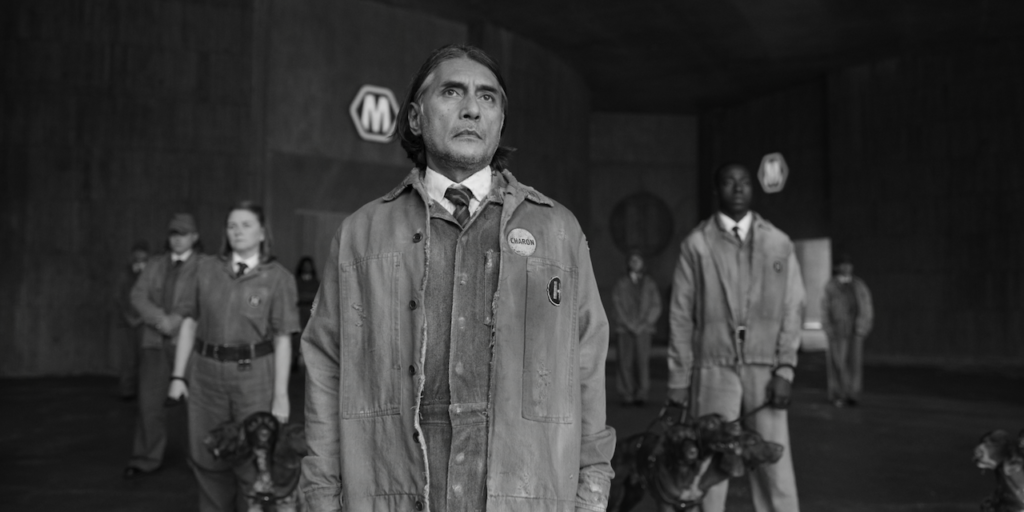“Kaos,” created, written and produced by the nonbinary Charlie Covell, is an apt title for the cheeky, imaginative and queer new series on Netflix about Greek mythology.
Set in contemporary times, the show opens with Zeus (Jeff Goldblum), acting vain and insecure as he fears a prophecy will come true and end his days as King of the Gods. If the desecration of his monument in Krete [sic] is any indication, he is not wrong to worry.
The series is narrated by Prometheus (Stephen Dillane), who is bound to a rock so an eagle can repeatedly peck at his liver. He advises viewers that three humans — Eurydice (Aurora Perrineau), who goes by “Riddy” here, Caeneus (trans actor Misia Butler), and Ari(adne) (Leila Farzad) — are going to bring Zeus down. This development causes Zeus to go a little mad. His wife Hera (Janet McTeer) tries to reassure him, although his brother, Poseidon (Cliff Curtis), is slightly less bothered.
The show features plenty of queer representation in every episode. Zeus’ son, Dionysus (Nabhaan Rizwan), the God of Pleasure, is pansexual and seen performing intimate acts with men and women. To curry favor with his father, he secretly helps Orpheus (Killian Scott) try to get his girlfriend Riddy back from the dead. This involves persuading the Fates — Lachy (the genderfluid Suzy Eddie Izzard), Atrophos (the nonbinary Sam Buttery), and Clotho (the nonbinary Ché) — to let Orpheus, a human, into the underworld.
Meanwhile, Riddy meets Caeneus, who discloses that he “wasn’t officially a boy” until his mid-teens. A flashback reveals how Caeneus was originally an Amazonian girl, Caenis, who dishonored the Gods after changing into a boy because, as his supportive mother acknowledges, “The form doesn’t fit the content.”

Several same-sex relationships are also featured in various episodes. One can’t be revealed, but Prometheus is canoodling in bed with Charon (Ramon Tikaram) when he asks his lover to assist someone who “bears a mark.”
How these queer and straight characters all intersect form the basis of each episode. The stories all feature characters doing things for what they think is “the greater good,” but it often comes at a personal cost. There are also discussions of fate and free will and living life fully.
The drama emerges from the power struggles that unfold as characters, particularly Dionysus and Zeus, act selfishly, causing a ripple effect to occur and their actions to impact others. “Kaos” sews its crazy quilt together as it develops various plots that connect or overlap as various characters are introduced, disappear, and sometimes (but not always) reappear later. This tapestry approach keeps viewers intrigued, but the zippy series does require keeping close track of everyone given all the interactions and relationships.
The show does feature some dark, irreverent humor, as when the King of the Gods goes on a killing spree to channel his anger — uttering a quiet “Oops” when he realizes he may have made a mistake in his actions. There are also witty moments, such as Poseidon taking a meeting at an aquarium, and some clever visuals, like Caeneus’ three-headed dog, Fotis, or a dumpster that becomes a portal to the river Styx.
Even if “Kaos” drops references to Greek mythology in little asides, such as a gas station named Tyndareus (The King of Sparta), one does not need to be familiar with the lore to follow the action. That said, the show will amuse any mythology buffs it doesn’t annoy with its update to the age of portable phones.
The series also benefits from its colorblind and gender fluid casting. The attractive actors are fun to watch as they fulfill or defy their various prophecies. Dionysus gives off a mischievous party-boy vibe that Nabhaan Rizwan leans into, and the Fates are always a delight to watch because they literally have all the power. While Jeff Goldblum is appropriately anxious and devious as Zeus, Janet McTeer is a standout as his formidable wife, Hera. She not only gets some fabulous costumes, but she can strike fear in the heart of anyone, including her husband, with just a glare, or a carefully worded speech. As Poseidon, Cliff Curtis exudes a louche coolness.
“Kaos” also provides some choice needle drops, from “Everything but the Girl” to Rupert Holmes, and the ironic use of “Oh, What a Beautiful Mornin’” as Zeus unleashes locusts, fires, tornadoes and other disasters in one of his “phases” of rage.
As the interconnected themes of life and death, power and love rise and converge in the end, “Kaos” deliberately sets things up for another season. Fans who warm to this cheeky series may exclaim, “Bring it on!”

